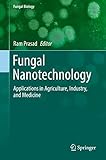Fungal nanotechnology : applications in agriculture, industry, and medicine / Ram Prasad, editor.
Material type: TextSeries: Fungal biology (Springer (Firm))Publisher: Cham, Switzerland : Springer, [2017]Description: 1 online resource (XI, 295 pages) : 47 illustrations, 41 illustrations in colorContent type:
TextSeries: Fungal biology (Springer (Firm))Publisher: Cham, Switzerland : Springer, [2017]Description: 1 online resource (XI, 295 pages) : 47 illustrations, 41 illustrations in colorContent type: - text
- computer
- online resource
- 3319684248
- 9783319684246
- 579.135 23
- TP248.27.F86
- TP248.27.F86
| Item type | Current library | Call number | Status | Date due | Barcode | |
|---|---|---|---|---|---|---|
| E-Resources | Abucay Library E-Resources | 579.135 (Browse shelf(Opens below)) | Available | E00078AC |
Includes bibliographical references and index.
Fungal Nanotechnology: A Pandora to Agricultural Science and Engineering -- Agriculture Applications of Entomopathogenic Fungi using Nanotechnology -- Fungi as Ecosynthesizers for Nanoparticles and Their Application in Agriculture -- Myconanotechnology in Agriculture -- Fungus-mediated Bioleaching of Metallic Nanoparticles from Agro Industrial By-products -- Synthesis and Applications of Nano-Fungicides: A Next Generation Fungicide -- Enzymes and Nanoparticles Produced by Microorganisms and Their Applications in Biotechnology -- Biological Nanoparticles: Optical and Photothermal Properties -- Biogenic Synthesis of Silver Nanoparticles and Their Applications -- Fungal Bionanotechnology, when knowledge Merge into a New Discipline to Combat Antimicrobial Resistance -- Fungal Nanotechnology and Biomedicine -- Myconanotechnology to Treat Infectious Diseases: A Perspective -- Nanobiotechnology Applications in Special Reference to Fungi.
Available to OhioLINK libraries.
Fungal nanotechnology has great prospects for developing new products with industrial, agricultural, medicinal, and consumer applications in a wide range of sectors. The fields of chemical engineering, agri-food, biochemistry, pharmaceuticals, diagnostics, and medical device development all employ fungal products, with fungal nanomaterials currently used in applications ranging from drug development to the food industry and agricultural biotechnology. Fungal agents are an environmentally friendly, clean, non-toxic agent for the synthesis of metal nanoparticles and employ both intracellular and extracellular methods. The simplicity of scaling up and downstream processing and the presence of fungal mycelia which afford an increased surface area provide key advantages. In addition, the large spectrum of synthesized nanoparticle morphologies and the substantially faster biosynthesis rate in cell-free filtrate (due to the higher amount of proteins secreted in fungi) make this a particularly enticing route. Understanding the diversity of fungi in assorted ecosystems, as well as their interactions with other microorganisms, animals, and plants, underpins real and innovative technological developments and the applications of metal nanoparticles in many disciplines including agriculture, catalysis, and biomedical biosensors. Importantly, biogenic fungal nanoparticles show significant synergistic characteristics when combined with antibiotics and fungicides to offer substantially greater resistance to microbial growth and applications in nanomedicine ranging from topical ointments and bandages for wound healing to coated stents.
There are no comments on this title.

